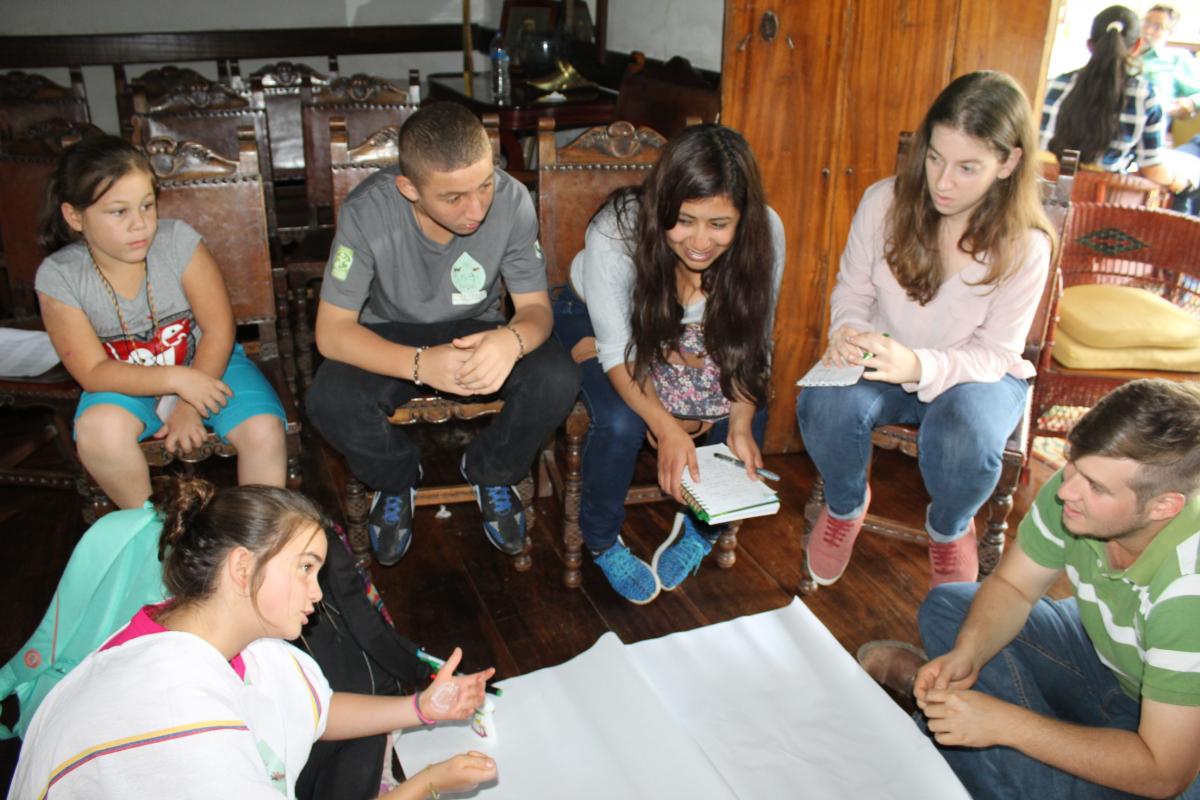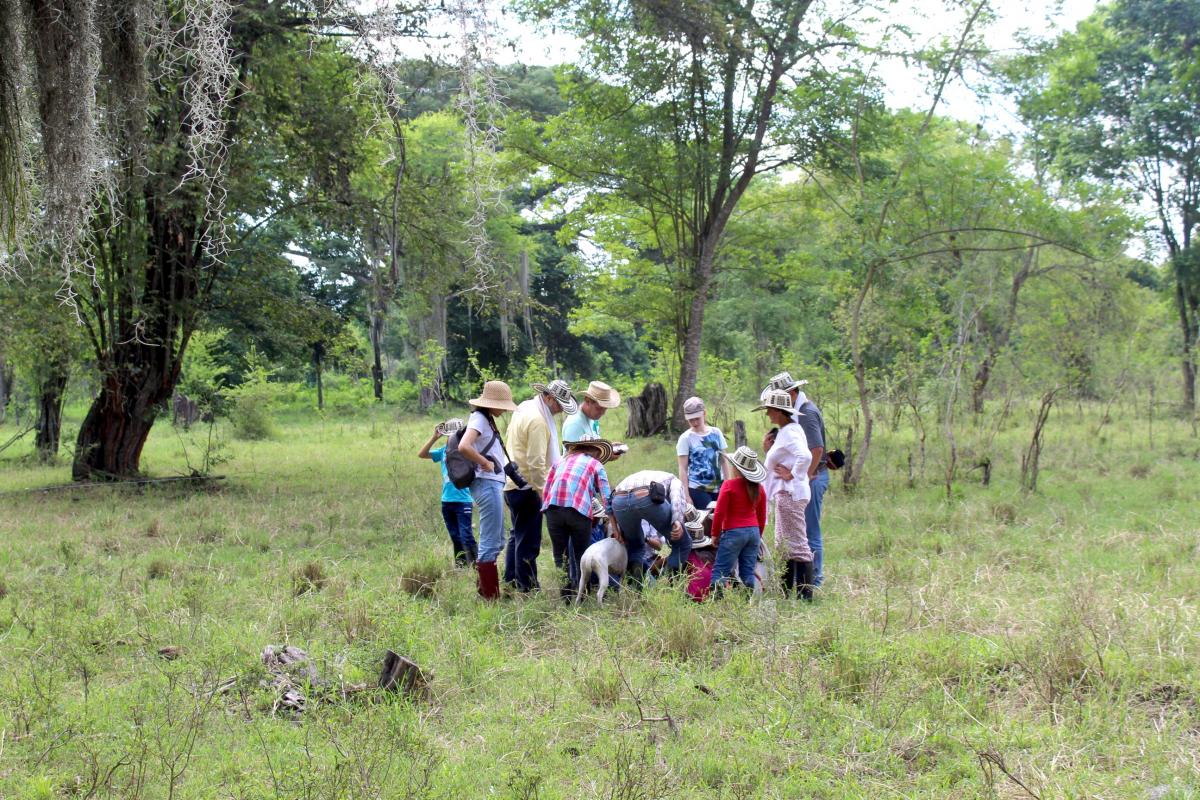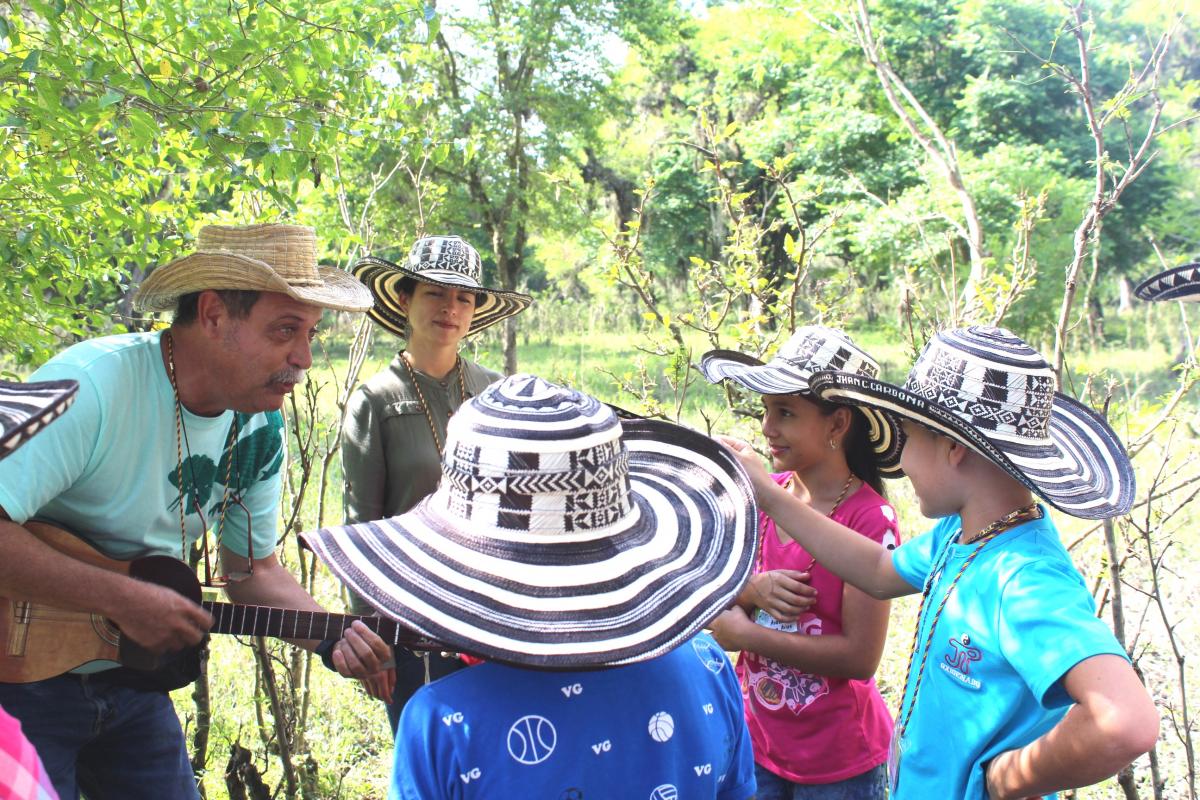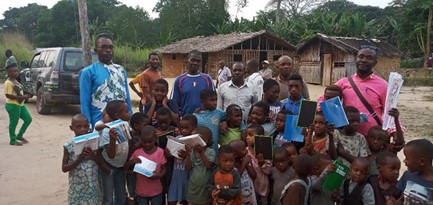Silvopastoral Heirs: ensuring cross-generational cultural change
Alicia Calle, a Ph.D. candidate from the University of California, Santa Cruz shares inspirational examples of sustainable farming practices and engaging youth in rural Colombia. IUCN supports her work as part of an effort to gather and share knowledge from a wide range of stakeholders who participate in forest landscape restoration.
On a warm afternoon a group of young kids watch as a farmer digs a hole in a cattle pasture outside Cali, Colombia. He passes around chunks of dark soil, and the discovery of earthworm tunnels and a dung beetle rolling a ball sparks a lively discussion about soil health. A second group of teens and young adults lingers behind, observing the mixed herd of cattle and buffalo grazing under the cool shade of the silvopastoral system. This hands-on tour of El Hatico Nature Reserve, a family-owned farm now known as a beacon for sustainable cattle production, will help participants envision a more sustainable future for their own farms.
Degraded cattle pastures are by far the dominant land cover in Colombia, present across practically all ecosystems. However, like in El Hatico, these unsustainable systems can be transformed into environmentally friendly silvopastoral systems (SPS) that enhance productivity, deliver environmental services, and ultimately also facilitate landscape restoration.
In order to scale up the use of SPS and their integration with ecological restoration practices, Colombia has been implementing the Mainstreaming Biodiversity in Sustainable Cattle Ranching Project1 in five different regions since 2012. Among the project’s legacies is a network of well-established pilot farms whose owners are committed to providing farmer-to-farmer training in the years to come. Having redefined their relationship with nature, these pilot farmers will help promote the kind of cultural change needed to achieve landscape transformation in Colombia. But cultural change is a long-term process that requires the transfer of both knowledge and values across generations.
Designed to foster this cross-generational relay, a three-day Silvopastoral Heirs Workshop2 at El Hatico brought together young people from 19 pilot farms in the project’s five regions, the upcoming generation of silvopastoral farmers. Individual presentations, lectures, field visits and folk songs were alternated with group exercises in which children, teens and adults worked collaboratively. The importance of family values, pride in a rural identity, and the need to heal the environment emerged as common threads throughout the discussions. A final definition of Silvopastoral Heirs (SH), their guiding values and principles, and their mission* was approved by consensus, and the Colombian Network of Silvopastoral Heirs was born.
Before heading back to their regions, the SH made personal commitments. Pledges include taking ownership and participating more actively in farmer-to-farmer trainings hosted at their farms; spreading the word about sustainable practices among friends and neighbors; documenting progress on their farms; or creating a knowledge-sharing platform. Opportunities for initial support through mentoring, capacity building, and small grants were also discussed.
Cattle ranching can be seen as either the main obstacle or the most significant opportunity for FLR in Colombia and elsewhere throughout the region. By choosing the latter, the SH have planted a small seed that, with proper care and additional support, could become a solid fruit-bearing tree.
Alicia’s research focuses on understanding how silvopastoral farmers in Colombia perceive the value and benefits of trees and forests, and how these perceptions impact their willingness to further engage in restoration activities.
Silvopastoral Heir: Children, teens and adults who gradually and voluntarily receive from their elders a legacy of principles and values grounded in the love of the land, and strive to give continuity to their family project.
*Mission: To generate and disseminate a culture of production in harmony with nature, to preserve and enrich the natural heritage, and improve the quality of life.
Values and principles of Silvopastoral Heirs:
- They understand the ecological, economic and social context of their farm, region and agroecosystem;
- They know how to do things with their hands;
- They understand that livestock production, agriculture and conservation are interlinked and thus cannot function independently;
- They persevere in their effort to improve the farming system in harmony with nature;
- They respect all life forms;
- They nurture their curiosity and capacity for wonder, and investigate and learn from their mistakes;
- They propose solutions and are not afraid of novel ideas;
- They respect the ideas of others and cultivate teamwork;
- They foster a dialogue of knowledge around conservation and production;
- They encourage other members of their communities to engage in the process;
- They are humble in learning and generous in teaching;
- They pass the family legacy on to future generations;
- They maintain and nurture their sense of belonging (to the land), no matter where they are;
- They understand that land management is a temporary, and entails a responsibility to society and to future generations.
- Supported by GEF, Department of Business, Energy & Industrial Strategy, World Bank Group, Fedegan, CIPAV, TNC, Fondo Acción
- Sponsored by the Center for Research on Sustainable Agricultural Production Systems (CIPAV), Colombian Cattle Ranching Federation (FEDEGAN), El Hatico Nature Reserve and The Environmental Leadership and Training Initiative (ELTI).






